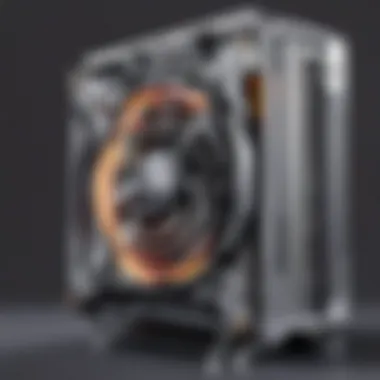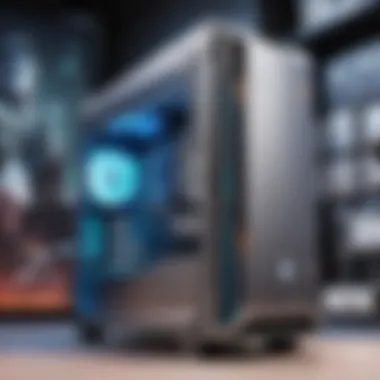Unveiling the Ultimate Specifications for an Enhanced Gaming PC Experience


Game Overview
When delving into the world of gaming PCs, understanding the optimal specifications is paramount for a seamless gaming experience. This section will highlight the key components that determine a gaming PC's performance, ultimately affecting the gameplay quality and enjoyment for players. From the central processing unit (CPU) to the graphics processing unit (GPU), each element plays a critical role in enhancing the gaming experience.
Introducing Gaming PC Components
To kick off our journey through the realm of gaming PC specifications, it is crucial to comprehend the significance of each component. The CPU acts as the brain of the system, handling essential tasks and calculations necessary for smooth gameplay. On the other hand, the GPU is responsible for rendering graphics, ensuring vibrant visuals and seamless frame rates. Without optimal CPU and GPU specifications, players may experience lag, screen tearing, or reduced image quality during gameplay.
RAM and Storage Capacity: The Unsung Heroes
While the CPU and GPU take the spotlight, the Random Access Memory (RAM) and storage capacity are unsung heroes that contribute significantly to a gaming PC's performance. RAM provides temporary storage for data that the CPU needs to access quickly, enhancing multitasking capabilities for smoother gameplay. Additionally, sufficient storage capacity ensures that games and other applications can be stored without compromising system performance. Balancing RAM and storage capacity is vital for optimizing the gaming experience.
Conclusion
Introduction: Unveiling the Core of Gaming PC
In the realm of gaming PC specifications, the Introduction sets the cornerstone for understanding the intricacies of building a powerhouse machine. This pivotal segment serves as the gateway to the realm of optimal configurations that intensify gaming experiences. Exploring the nuances of CPU, GPU, RAM, storage, cooling, power supply, motherboard, case design, and monitor requirements, the Introduction functions as a beacon, guiding enthusiasts through the labyrinth of technological choices.
Embarking on this enlightening journey entails a deep dive into the key elements that define a high-performance gaming PC. From the blazing speeds of CPU cores to the visual splendor rendered by cutting-edge GPUs, every component amalgamates to forge an immersive world of gaming bliss. Understanding the impact of clock speeds, multitasking prowess, graphics memory, CUDA cores, ray tracing capabilities, RAM capacity, SSD superiority, efficient cooling solutions, optimal power delivery, compatible motherboard selections, and airflow-centric case designs is paramount in sculpting a competitive gaming rig that defies boundaries.
Delving into the essence of each component unravels a tapestry of technical brilliance and strategic foresight. The Introduction doesn't merely scratch the surface; it peels back layers of complexity to reveal the foundational principles that underpin a gamer's conquest for supremacy in the digital domains. By unraveling the enigma of optimal specifications, players can elevate their gameplay to unprecedented levels, immersing themselves in a realm where performance meets perfection.
CPU Selection
In the realm of crafting the ideal gaming PC, the CPU selection stands as a pivotal decision, exerting a substantial influence on the system's overall performance. The CPU, or Central Processing Unit, serves as the core brain of the machine, responsible for executing instructions and tasks with precision and speed. When delving into CPU selection, various specific elements merit consideration to ensure optimal gaming experiences.
Core Count
The core count of a CPU speaks volumes regarding its processing capabilities. A higher core count signifies enhanced multitasking potential, allowing the CPU to handle multiple tasks concurrently. For gamers, this translates to smoother gameplay, particularly in demanding titles that require robust processing power. Considering modern gaming landscapes where games are becoming more CPU-intensive, opting for a CPU with a respectable core count proves advantageous.
Clock Speed
Clock speed, measured in GHz, dictates the rate at which a CPU executes instructions. A higher clock speed signifies faster processing, enabling swift execution of gaming commands. Gamers seeking seamless experiences, especially in fast-paced action games or multiplayer environments, should prioritize CPUs with high clock speeds for snappy responsiveness and reduced lag.


Multitasking Capability
The multitasking capability of a CPU assesses its prowess in handling multiple applications simultaneously. For gaming enthusiasts who often engage in live streaming, content creation, or running background processes while gaming, opting for a CPU with robust multitasking capabilities becomes imperative. Boosting multitasking performance ensures smooth gameplay alongside additional tasks, enhancing the overall gaming experience. Careful consideration of core count, clock speed, and multitasking capabilities in CPU selection paves the way for a well-rounded gaming PC setup.
GPU Considerations
Graphics Memory
Graphics memory, also known as video memory or VRAM, is a critical component of the GPU that stores image data, textures, and frame buffers. A higher graphics memory capacity allows for the storage of more graphical data, reducing loading times and enhancing visual fidelity in games. When choosing a GPU, opt for models with ample graphics memory to support high-resolution gaming and complex graphics rendering. Considerations should be made based on the intended gaming resolutions and settings to ensure optimal performance.
CUDA Cores
CUDA cores are parallel processing units within NVIDIA GPUs that accelerate graphics rendering, computational tasks, and AI processing. The number of CUDA cores directly influences the GPU's performance in handling complex gaming scenarios, such as rendering detailed environments and executing real-time physics simulations. When evaluating GPUs for gaming, prioritize models with a higher count of CUDA cores for improved gaming performance and smoother frame rates. CUDA cores play a significant role in optimizing gaming experiences, especially in resource-intensive games that rely on efficient parallel processing.
Ray Tracing Support
Ray tracing is a cutting-edge rendering technique that simulates the behavior of light in virtual environments, enhancing visual realism and immersion in games. GPUs with ray tracing support utilize specialized hardware to trace light paths, shadows, and reflections accurately, resulting in lifelike graphics with realistic lighting effects. When selecting a GPU for gaming, choosing a model with ray tracing support can elevate visual quality and realism, transforming gaming experiences with cinematic visuals and authentic lighting effects. Ray tracing-capable GPUs are ideal for gamers seeking unparalleled graphical fidelity and immersion in modern titles that leverage this advanced rendering technology.
RAM Capacity
When it comes to optimizing your gaming PC, the RAM capacity is a pivotal element that cannot be overlooked. Random Access Memory (RAM) serves as the temporary storage for data that your CPU needs to access quickly. The higher the RAM capacity, the more data your system can handle simultaneously, leading to smoother gameplay and faster loading times.
One crucial benefit of having ample RAM capacity is the improved multitasking capability. In a gaming setup, this means being able to run multiple applications in the background without compromising gaming performance. For instance, streaming your gaming sessions while playing a resource-intensive game becomes seamless with sufficient RAM capacity.
Moreover, RAM capacity plays a significant role in maintaining a stable framerate during gameplay. When your system has enough RAM, it can store and retrieve game data efficiently, reducing stuttering and lag spikes that can detract from the gaming experience. High-speed RAM modules can further enhance this aspect, providing quicker access to data for enhanced performance.
Considerations when determining the optimal RAM capacity for your gaming PC include the type of games you play and whether you engage in other resource-intensive tasks concurrently. Games with large open worlds or high-resolution textures benefit from higher RAM capacities to ensure a smooth experience. Additionally, content creation tasks like video editing or 3D rendering also demand more RAM to operate efficiently.
Storage Solutions
When it comes to building an optimal gaming PC, one critical aspect that should not be overlooked is the choice of storage solutions. The importance of storage solutions in the context of gaming PCs lies in their ability to store and access vast amounts of data quickly and efficiently. Opting for the right storage solution can significantly impact the overall performance and loading times of games, making the gaming experience smoother and more enjoyable.
SSD vs. HDD


A key decision that gamers face when selecting storage solutions is choosing between Solid State Drives (SSD) and Hard Disk Drives (HDD). SSDs offer faster read and write speeds, resulting in quicker boot times, faster loading screens, and snappier overall system responsiveness. On the other hand, HDDs provide larger storage capacities at more affordable prices, making them suitable for storing extensive game libraries and media files. Gamers need to weigh the trade-offs between speed and capacity to determine which type of drive best suits their gaming needs and budget.
NVMe Drives
NVMe (Non-Volatile Memory Express) drives represent the next level of storage performance for gaming PCs. These drives leverage the PCIe interface to deliver unmatched data transfer speeds, reducing load times to a minimum. NVMe drives are ideal for those who demand top-tier performance and lightning-fast access to their game files. With NVMe drives, gamers can experience near-instantaneous game load times and seamless transitions between game scenes, enhancing the overall gaming immersion and enjoyment. Integrating NVMe drives into a gaming PC ensures that the storage element of the system operates at peak efficiency, maximizing the gaming experience to its fullest potential.
Cooling Systems
When it comes to optimizing the performance of your gaming PC, the topic of cooling systems cannot be overlooked. Cooling systems play a pivotal role in maintaining the temperature levels of crucial components, such as the CPU and GPU, ensuring that your system operates efficiently and without overheating during graphic-intensive gaming sessions. One of the key elements to consider when deliberating cooling systems is the type of cooling solution - whether air cooling or liquid cooling. Air cooling involves fans that dissipate heat from the components, while liquid cooling utilizes coolant circulating through a closed loop to absorb and eliminate heat more effectively. Both options have their pros and cons, with air cooling being more cost-effective and easier to install, while liquid cooling provides superior heat dissipation but at a higher cost and complexity of setup.
Additionally, the size and placement of fans within the PC case along with the presence of heat sinks and thermal paste are essential considerations when assessing cooling systems. Proper airflow management is critical for expelling hot air and drawing in cooler air, preventing thermal throttling and maintaining consistent performance levels. Adequate cooling not only enhances the longevity of your hardware but also ensures stable and reliable operation under demanding gaming loads. When selecting cooling systems for your gaming PC, it is paramount to strike the right balance between performance, cost, and maintenance requirements to create an optimal gaming setup that runs smoothly and efficiently.
Power Supply Unit
In the realm of gaming PCs, the Power Supply Unit (PSU) stands as a silent champion, often overlooked but absolutely critical to the system's performance and longevity. As the unsung hero behind the scenes, the PSU is responsible for supplying stable power to all components, ensuring smooth operations and protection against power fluctuations. When selecting a PSU for your gaming rig, there are several key elements to consider that can make a substantial difference in overall performance.
Wattage and Efficiency
One of the primary considerations when choosing a PSU is its wattage rating. Opting for a PSU with adequate wattage is essential to accommodate the power demands of high-performance components like advanced GPUs and CPUs. Overloading a PSU can lead to stability issues, reduced lifespan of components, or even system crashes. Additionally, selecting a PSU with high efficiency ratings such as 80 Plus Bronze, Silver, Gold, or Platinum can help minimize power loss through heat dissipation, resulting in lower energy bills and a more environmentally friendly setup.
Modular vs. Non-Modular Design
Another aspect to contemplate is whether to opt for a modular or non-modular PSU. Modular PSUs allow for customizable cable management by detaching unused cables, enhancing airflow and aesthetics within the case. On the other hand, non-modular PSUs come with a fixed set of cables, potentially leading to clutter and hindering airflow. For gamers focused on optimizing cooling efficiency and maintaining a clean interior layout, a modular PSU can be a worthwhile investment.
Voltage Regulation and Overcurrent Protection
Voltage regulation and overcurrent protection are crucial features that a high-quality PSU should offer. Consistent voltage outputs ensure stable and reliable performance of components, aiding in overclocking endeavors and preventing damage from power surges. Overcurrent protection safeguards components from drawing more current than they can handle, avoiding potential hardware failures or hazards. Prioritizing PSUs with robust voltage regulation and overcurrent protection mechanisms can contribute significantly to the overall longevity of a gaming PC.
Conclusion
In essence, the Power Supply Unit is the backbone of a gaming PC, providing the necessary energy for all other components to function harmoniously. By carefully considering factors like wattage, efficiency, modularity, voltage regulation, and overcurrent protection, gamers can ensure a robust power delivery system that supports their high-performance gaming endeavors effectively. Choosing a reliable and efficient PSU is not merely a technicality but a strategic investment in the performance and durability of your gaming setup.
Motherboard Selection: The Backbone of Gaming PCs


Selecting the right motherboard for your gaming rig is paramount to its overall performance and functionality. The motherboard, often dubbed as the nervous system of a PC, acts as the central hub connecting all components together. When delving into the realm of motherboard selection for a gaming PC, several critical factors come into play, influencing not only the system's compatibility but also its potential for future upgrades and expansions.
Factors to Consider
- Socket Type and Chipset Compatibility: One of the primary considerations when choosing a motherboard is ensuring compatibility with the CPU. Matching the socket type of the processor with the motherboard is crucial for seamless operation. Additionally, checking the chipset compatibility for optimal performance is essential in maximizing the gaming experience. Opting for a motherboard that supports the latest chipsets can future-proof your build and enhance your gaming capabilities.
- Expansion Slots and Ports: The availability of expansion slots and ports on a motherboard can significantly impact the gaming experience. Having sufficient slots for additional components such as graphic cards, sound cards, or M.2 drives allows for customization and upgrading based on individual preferences. Multiple USB ports, including high-speed USB 3.0 and 3.1 ports, enable quicker data transfer and connectivity to various devices, enhancing the overall user experience.
- VRM Quality and Power Delivery: A robust Voltage Regulator Module (VRM) design and efficient power delivery are vital for stable performance, especially during intense gaming sessions. Opting for a motherboard with high-quality VRMs and sufficient power phases ensures reliable power distribution to the CPU, minimizing the risk of overheating or system instability. Advanced cooling solutions around the VRM area can also contribute to prolonged durability and optimal performance.
- Memory and Storage Support: The motherboard's capability to support diverse memory modules and storage configurations plays a crucial role in enhancing gaming performance. Selecting a motherboard that accommodates high-speed RAM modules and fast storage devices such as NVMe SSDs can lead to reduced loading times, smoother gameplay, and overall improved system responsiveness.
Conclusion
Case Design and Airflow
When it comes to optimizing a gaming PC for peak performance, one crucial yet often underestimated aspect is the design of the casing and airflow within the system. The case design and airflow play a significant role in maintaining the internal temperatures of the components at optimal levels, ensuring smooth and uninterrupted gaming sessions.
Importance of Case Design and Airflow
The case serves as the housing for all internal components of the gaming PC. A well-designed case not only enhances the aesthetic appeal of the setup but also contributes to the functionality of the system. Proper airflow management within the case is essential for dissipating heat generated by high-performance hardware components such as the CPU and GPU. Efficient airflow prevents the accumulation of heat, which can lead to thermal throttling and reduced performance.
Specific Elements to Consider
When selecting a case for a gaming PC, factors such as the number and placement of fans, the presence of dust filters, cable management options, and overall airflow design should be taken into account. A case with good airflow design will have strategically placed intake and exhaust vents to facilitate natural heat dissipation. Additionally, investing in quality case fans can further improve airflow within the system, keeping temperatures at bay during intense gaming sessions.
Benefits of Optimal Case Design
Optimizing case design and airflow in a gaming PC offers several benefits. By maintaining lower internal temperatures, components such as the CPU and GPU can operate more efficiently, resulting in greater stability and potentially longer lifespan. Improved airflow also reduces the risk of hardware failure due to overheating, providing a more reliable gaming experience. Additionally, efficient cooling can prevent noise levels from escalating, ensuring a quieter gaming environment.
Considerations for Case Design and Airflow
When considering case design and airflow, it is essential to strike a balance between aesthetics and functionality. Opt for a case that not only looks appealing but also prioritizes airflow optimization. Customizable fan configurations, liquid cooling support, and spacious interiors for proper cable management are factors to consider when selecting the ideal case for your gaming setup. Remember, a well-ventilated system is key to achieving optimal performance and longevity for your gaming PC.
Monitor Requirements
In the realm of optimizing a gaming PC for peak performance, ensuring the right monitor requirements are met is often an overlooked yet crucial aspect. The monitor serves as the window to the virtual worlds that gamers immerse themselves in, and its significance in the overall gaming experience cannot be overstated. When delving into the world of monitor requirements, several specific elements come into play, each impacting the gameplay in distinct ways.
First and foremost, the resolution of the monitor plays a pivotal role in the visual quality of the games. Gamers aiming for crystal-clear graphics and immersive gameplay should opt for monitors with higher resolutions such as 1440p or 4k. These resolutions offer sharper images, more detailed environments, and a truly captivating visual experience.
Additionally, refresh rate is a key consideration when it comes to monitor requirements. A higher refresh rate, such as 144Hz or 240Hz, ensures smoother motion transitions and reduces motion blur, providing a competitive edge in fast-paced games where split-second reactions matter. Gamers who prioritize fluidity and responsiveness in their gameplay should opt for monitors with higher refresh rates.
Moreover, panel technology is another critical factor to keep in mind when choosing a monitor for gaming purposes. The two primary panel types, namely IPS (In-Plane Switching) and TN (Twisted Nematic), offer different advantages and cater to varying preferences. IPS panels provide superior color accuracy and wider viewing angles, ideal for gamers who value visual fidelity and color consistency. On the other hand, TN panels boast faster response times, making them suitable for competitive gamers who prioritize speed and responsiveness.
Considering these elements, selecting the optimal monitor requirements for a gaming PC is a meticulous process that involves weighing the benefits of each aspect to create a setup that aligns with individual preferences and gaming priorities. By understanding the significance of resolution, refresh rate, and panel technology, gamers can tailor their monitor choice to enhance their gaming experience and immerse themselves in the virtual realms with optimal visual acuity and responsiveness.



